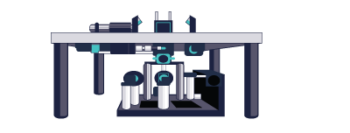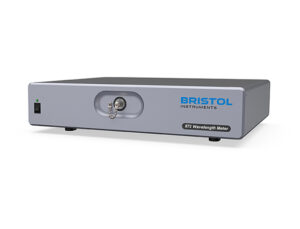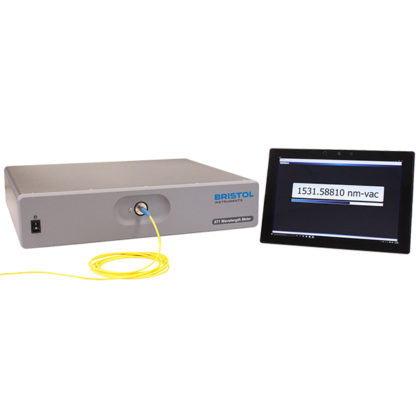872 Series Pulsed & CW Laser Wavelength Meter
- Measurement resolution as fine as 200 kHz.
- Wavelength accuracy up to ± 0.0001 nm.
- Automatic calibration with a built-in wavelength standard.
- Operation available from 375 to 1700 nm.
- Sustained measurement rate of 1 kHz.
- Convenient pre-aligned fiber-optic input.
- Built-in PID controller for precise laser stabilization.
- Optional Fiber-Optic Switch accessory enables the characterization of up to 8 lasers with a single instrument.
- Five-year warranty covers all parts and labor.
High Measurement Resolution
The 872 Series Laser Wavelength Meter from Bristol Instruments builds upon our unique Fizeau etalon technology to offer very high measurement resolution. This results in exceptional sensitivity to wavelength deviations making the 872-system ideal for the frequency stabilization of lasers. Two versions of the 872 Laser Wavelength Meter are available.
Advanced Precision and Versatility in Wavelength Measurement
The model 872A-VIS operates over the range of 375 to 1100 nm, and the model 872A-NIR works from 630 to 1700 nm. These instruments both provide wavelength accuracy of ± 0.2 parts per million (± 60 MHz at 1000 nm) and frequency resolution of 1.0 part per billion (300 kHz at 1000 nm). Automatic calibration with a built-in wavelength standard guarantees this performance to ensure the most meaningful experimental results.
| Specifications |
| Model |
872A |
| Laser Type |
Pulsed and CW |
| Wavelength |
| Range |
VIS: 375 – 1100 nm
NIR: 630 – 1700 nm |
| Accuracy 1,2,3 |
0.2 ppm (single-mode fi ber)
± 0.0002 nm @ 1000 nm
± 60 MHz @ 300,000 GHz |
| Measurement Resolution 4 |
.001 ppm (1.0 ppb)
0.001 pm @ 1000 nm
300 kHz @ 300,000 GHz |
| Calibration 5 |
Automatic with built-in wavelength standard |
| Display Resolution |
9 digits |
| Units |
nm, μm, cm-1, GHz, THz |
| Optical Input Signal |
| Maximum Bandwidth (FWHM) |
1 GHz |
| Minimum Input 7, 8, 9, 10 |
VIS: 3 – 300 nJ
NIR: 50 – 600 nJ |
| Maximum Input |
CW: 10 mW Pulsed: 0.5 mJ (10 ns duration) |
| Measurement Rate |
1 kHz |
| Inputs/Outputs |
| Optical Input 11, 12 |
Pre-aligned FC/PC fier connector (optional free beam-to-fiber coupler) |
| Instrument Interface |
SB and Ethernet interface with Windows-based display program, and browser-based display application
Streaming via RS-422 (internal or external TTL trigger)
Internal data storage for up to 1 million measurements
Library of commands (SCPI) for custom and LabVIEW programming using any PC operating system
PID controller (± 5 V output) |
| Computer Requirements 13 |
PC running Windows 10, 1 GB available RAM, USB 2.0 (or later) port, monitor, pointing device |
| Environmental [8] |
| Warm-Up Time |
15 minutes |
| Temperature | Pressure | Humidity |
+15°C to +30°C (-10°C to +70°C storage) | 500 – 900 mm Hg | ≤ 90% R.H. at + 40°C (no condensation |
| Dimensions and Weight |
| Dimensions (H x W x D) |
3.5″ x 17.0″ x 15.0″ (89 mm x 432 mm x 381 mm)
Includes mounting hardware for 19-inch racks |
| Weight |
17 lbs (7.65 kg) |
| Power Requirements |
90 – 264 VAC, 47 – 63 Hz, 50 VA max |
| Warranty |
5 Years (parts and labor) |
[1] Defined as measurement uncertainty, or maximum wavelength error, with a confidence level of ≥ 99.7%.
[2] Traceable to accepted physical standards.
[3] Single-mode input fiber must have single-mode performance at the wavelength of the laser under test.
[4] Standard deviation.
[5] For VIS version, stabilized single-frequency HeNe laser. For NIR version, laser diode locked to acetylene absorption (NIST Special Publication 260-133).
[6] Data in units of nm, μm, and cm-1 are given as vacuum values.
[7] Characteristic performance, but non-warranted.
[8] Required minimum energy from a single laser pulse. Greater sensitivity is achieved by increasing the length of the measurement window to allow for
the integration of a greater number of laser pulses.
[9] Required minimum power is approximated by multiplying the required minimum energy by the selected measurement rate.
[10] Sensitivity at specific wavelengths can be determined from graphs that are provided in the 871 Series Product Details brochure.
[11] Visual inspection and optimization of the interference fringe pattern is not required.
[12] An FC/PC terminated input fiber is required. System will not operate with FC/APC terminated fiber.
[13] For use with Windows-based display program. Interfacing via SCPI can be done using any PC operating system.

































